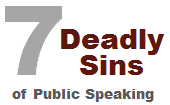
Some will argue that Barack Obama’s Inauguration speech was not his most electric speech, or that it failed to deliver on unreasonably high expectations.
Nonetheless, studying the speech provides five key speechwriting lessons that can help us all be better communicators.
This article is the latest in a series of video speech critiques which help you analyze and learn from excellent speeches.








































